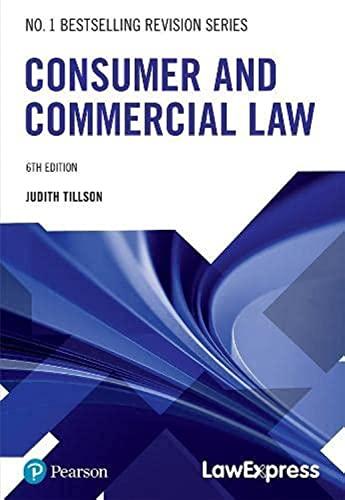Question
I need help replying to this discussion board post as well. Rules 3.1-3.3of the American Bar Association's Model Rules of Professional Conduct discuss the
I need help replying to this discussion board post as well.
"
Rules 3.1-3.3of the American Bar Association's Model Rules of Professional Conduct discuss the lawyer's role as an advocate in regards to meritorious claims and contentions, candor towards the tribunal, and expediting litigation. Rule 3.1 discusses meritorious claims and contentions. In general, this rule provides that a lawyer, and a Christian lawyer especially, has an ethical obligation to investigate whether their client's claim has a factual or legal foundation before proceeding. This rule would be violated if a lawyer knowingly brought before the court a case with a baseless legal foundation. A lawyer can prevent this, by investigating or inquiring to determine that there is evidence to support the claim. Model Rule 3.1 touches on the biblical principle of honesty. "To abide by the numerous biblical precepts on honesty, the Christian attorney should this stick strictly to the truth and should not attempt to deceive others with nonmeritorious claims," (Gantt2006). On the other hand, Model Rule 3.2 covers "reasonable efforts to expedite litigation consistent with the interests of the client," (American Bar Association 2021). While this rule is affirmed by the biblical principles of diligence and readiness, a lawyer failing to comply with requests from opposing counselwould be considered a violation of Rule 3.2. Proverbs 12:24reads, "Lazy hands make for poverty, but diligent hands bring wealth," (New International Version). Like Gantt says in his writing in the Regent University Law Review, "...it is the lawyer's livelihood and calling," (2006). While financial motivation should not be the driving force behind an attorney's work, clearly it is biblical that diligence in one's work will lead to prosperous results. "Many verses in Proverbs contrast diligence and the sluggard. TheChristian attorney should thus make sure that he or she does not unnecessarily hold back the course of litigation," (Gantt). Rule 3.3 prohibits attorneys from lying to the court, falsifying evidence or statements, and if the lawyer learns of the false information ex post facto and does not take "reasonable remedial measures," there may be consequences.The biblical virtues of honesty, personal responsibility, and integrity, among others, affirm this rule. 2 Corinthians 13:8 reads, "For we cannot do anything against the truth, but only for the truth," (New International Version). As we have seen time and time again, the principle of honesty is upheld throughout the entire Bible, and the Bible does not condone "bearing a false witness." Therefore, "Directing attorneys to remedy and "undo" false testimony is consonant with biblical principles," (Gantt)."
Step by Step Solution
There are 3 Steps involved in it
Step: 1

Get Instant Access to Expert-Tailored Solutions
See step-by-step solutions with expert insights and AI powered tools for academic success
Step: 2

Step: 3

Ace Your Homework with AI
Get the answers you need in no time with our AI-driven, step-by-step assistance
Get Started


